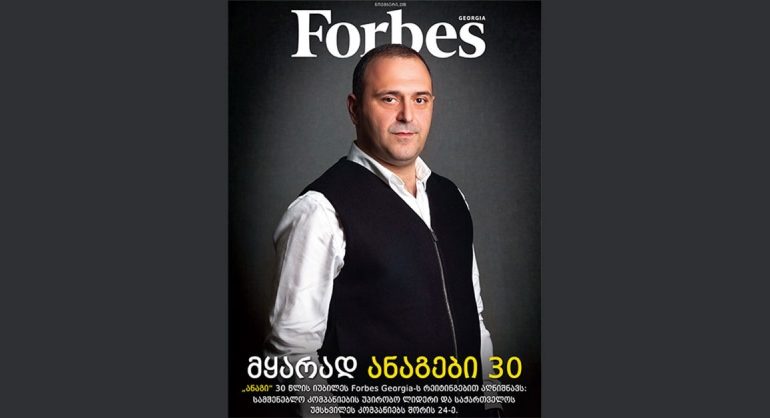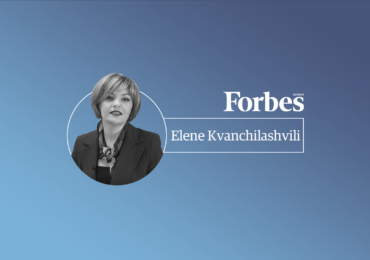Forbes Georgia spoke to the General Director of Anagi, Irakli Gogolishvili, about the company’s plans for the current year as well as the past 30 years’ achievements.
Georgia’s leading construction company, Anagi, is celebrating its 30th anniversary. Over the past three decades, the company has contributed over 300 million GEL to the state budget. In 2018 alone, its revenue reached the 250 million GEL mark. Anagi employs around 3,000 people, and has completed 250 projects during its existence, therebyenablingthe company to secure its position as the market leader.
Anagi conducts most of its business in civil and industrial construction; the company’s activities encompass everything in these fields. The company offers its partners and clients a full package of services, from planning works to putting the buildings into operation.
The company’s portfolio boasts an impressive list of projects completed during its 30-year history; including anaircraft parts factory, Galleria Tbilisi, the renovation of Orbeliani Square, Gudiashvili Square and the Tbilisi Assembly building, the Hilton hotel, the Piazza in Batumi, East Point mall, recreational and sports complexes, underground parking lots, as well as industrial facilities.
These complex projects are mastered by the Anagi Group through several companies that are united under the Anagi brand. Construction machinery and equipment is managed by Anagi Mechanization; this modern construction material factory is operated by Lugo LLC; accreditation for construction materials and products is provided by the testing laboratory Mshentekkontroli Ltd, which operates in accordance with the methodology as per industry standards; and planning works are carried out by another separateindependent group. In addition to the above, Anagi Development will carry out construction of residential complexes starting from this year. The first development project will be implemented in Tbilisi. Forbes Georgia spoke to the General Director of Anagi, Irakli Gogolishvili, about the company’s plans for the current year as well as the past 30 years’ achievements.
Let us begin with Anagi’s first steps in the construction sector. Presumably, the circumstances in Georgia in 1989 were far from easy. What level of experience and financial capital did the company’s founders have at the time?
The Soviet Union was unravelling, and construction in Georgia was entering a new era. Cooperatives were springing up, and Anagi’s first organizational and legal form was precisely that of a cooperative. The only real capital available to the company founders was human capital in the shape of their own intellectual resources. These Georgian Polytechnical Institute graduates had accumulated a certain amount of experience at university and throughpractical training. As for funds, they only had $500 available to them, if I remember correctly. Naturally, nowadays it would be impossible to start a business of this kind with such a small amount.
What were the crucial early projects for Anagi?
During the early stages of our operation, we implemented numerous projects in Adjara. These included the renovation of a wine factory, colleges and universities in Batumi. We then carried out industrial projects in the Poti Sea Port; building ship berths for the terminal. Many construction firms find it difficult to perform such operations even today, as they require a combination of professionalism, expertise and engineering solutions.
What are your company’s competitive advantages?
Quality, reasonable timeframes for planning and development of the work process, a continuous construction cycle and solid implementation of new technologies. Our pricing policy is also worthy of being considered as a competitive advantage.
What services can the customer receive from Anagi under the one-window principle, and aside from dealing with construction-related issues, do you also provide project documentation?
We mainly offer construction-related services to the market, but apart from construction equipment, materials and laboratory services provided by our group’s member companies, we also carry out planning works.
It is one thing for an investor or capital owner to wish to build a hotel, a residential block or a shopping center and come to us with an appropriate permit, seeking to get precisely the type of building that is shown on the paper. It is another thing altogether when an investor gives us a general outline and tasks us with obtaining the necessary permits from the relevant authorities. Thisrequires a different approach thatcombines construction and planning.
On the back of this experience, you are moving into development this year. Anagi Development will become a new part of your group. Why did you make this decision now, 30 years after starting the business? If possible, it would also be interesting to know the location and detailsof your first development project.
Why now – well, that is a difficult question to answer. After 30 years, we decided to try something new. However, this is not our main area of activity, and our focus will clearly be on quality and comfort, rather than on quantity orscale.
We are building a residential complex close to the New Road. We will offerturnkey apartments, unfinished apartments where the buyer can complete them to their requirements, and a third option. Let’s call it an ‘Anagi frame’, meaning that the buyercan bring along a craftsman, paint the rooms, and everything will be ready in no more than a month.
Project planning now requires adherence to new, stricter occupational health and safety regulations. How does this affect your investment plans and timeframes?
In this regard, our tasks and objectives have almost tripled in number over the last three years. We welcome these developments. Maintaining occupational health and safety norms requires a certain level of experience and suitably qualified personnel, as well as the appropriate tools and equipment. All of this is associated with high expenses.
The regulations are becoming increasingly strict, and we are trying to staff our buildings with the appropriate personnel, but it is very difficult to find specialists with suitable knowledge of health and safety norms. We began training such personnel a year ago. These are highly paid employees, which does affect the project budget and timeframe. However, we must go along with it, as health and safety are non-negotiable.
Apart from the health and safety aspects, how difficult is it for you to find personnel, bearing in mind that you are operating in almost all areas of civic construction?
Whenever we hire someone – I am talking about project managers and various specialists – we always aim to establish long-term contractual professional relationships. We try to create an environment that allows us to retain as many of our employees as possible.
Your portfolio includes numerous highly impressive projects. Were any of them particularly difficult to execute?
The Mestia Airport was built in extremely tough weather conditions. Basically, we managed to complete this difficult project in winter snow without deviating from the set timeframe and our quality standards. Today, we can speak about the Mestia Airport as one of our many successful undertakings. From the more recent projects, I would probably highlight Galleria Tbilisi on Rustaveli Avenue. Construction was taking place in city center, on top of a metro station. The greatest challenge was to plan and execute the construction process without hindering the operation of the metro, the Griboedov Theatre and the Free Theatre. Naturally, we completed the facility on time and to a very high standard.
I would like to ask you about planned and ongoing projects that fall under Anagi’s main scope of activity, rather than in the development segment.
First and foremost, I would highlight the new 20,000seat football stadium in Batumi, which will be completed in March 2020 – eight months ahead of schedule. Thus, it will soon become a calling card for the city of Batumi and have a special place in our portfolio, as a sports building of this magnitude is quite difficult to build. An equally important and technically challenging project is the construction of the new Kutaisi International Airport terminal.
This year, Anagi was ranked 24th on the Forbes list of largest Georgian companies, holding the top position among allconstruction firms. In your opinion, which of the company’s recognitions are particularly noteworthy?
I have already talked quite extensively about Anagi’s construction portfolio and operations. I will, therefore, start by saying that nobody can explain the success of our business better than the world’s leading business publication and its index. It reflects our efforts and presents the scope and scale of our activities in the form of statistics and numbers.
As for your question specifically, I would probably once again highlight the recognition of our quality, which we received in August 2019 in the form of the ‘ISO 45001:2018’ certificate; becoming the first Georgian company to do so. This certificate represents the leading international management standard that identifies best practices in occupational health, safety and hygiene. Anagi is the only Georgian organization to independently implement and audit the ‘ISO 45001’standard in its management system. This standard is designed to ensure implementation of health, safety, environmental and quality norms that are fully embraced by everyone at Anagi. I would also add that this year, Anagi successfully completed the ‘O9001:2015’ audit; retaining the international quality control certificate thatit obtained in 2017.
Finally, I would like to highlight the professional recognition received by Anagi team members. In 2013, our Head of Production (Ibraim Shalikadze) was awarded the title of Merited Builder of Georgia. Last year, the same title was awarded to our Senior Site Manager (Davit Shalikadze) for his special contribution to the development of construction in Georgia. This award is issued by the Georgian government through the Ministry of Economy & Sustainable Development; it is handed out every five years. Such recognition is very important for us. Personally, I am immensely proud to lead a team made up of such well-regarded and highlyrecognized professionals.












